Artificial Intelligence Sensor Market Summary
The Global Artificial Intelligence (AI) Sensor Market was valued at $3.2 billion in 2022 and is projected to reach $103.4 billion by 2032, growing at a CAGR of 41.8% from 2023 to 2032. This is fueled by rising demand in smart devices, autonomous vehicles, healthcare, and industrial automation. These sensors enable real-time data processing and intelligent decision-making. Growth is supported by advancements in AI and IoT, though high implementation costs and data privacy remain key challenges.
Market Dynamics & Insights
- The artificial intelligence (AI) sensor industry in North America held a significant share of over 36.7% in 2022.
- The artificial intelligence (AI) sensor industry in Germany is expected to grow significantly at a CAGR of 42% from 2023 to 2032.
- By type, the optical segment is one of the dominating segments in the market and accounted for the revenue share of over 41.5% in 2022.
- By application, the consumer electronics segment is the fastest-growing segment in the market.
Market Size & Future Outlook
- 2022 Market Size: $3.2 Billion
- 2032 Projected Market Size: $103.4 Billion
- CAGR (2023-2032): 41.8%
- North America: Largest market in 2022
- Asia-Pacific: Fastest growing market
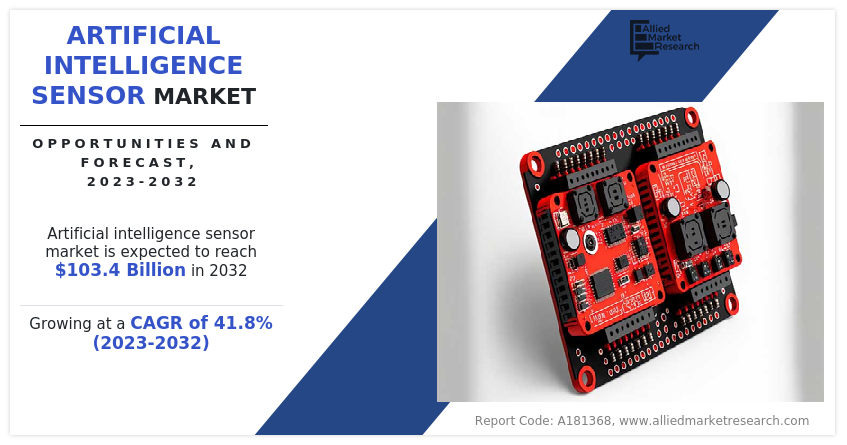
Artificial intelligence sensors are devices that can perform complex tasks such as self-validation, self-adaptation, and self-identification under various conditions. Intelligent sensor technology refers to sensors used in artificial intelligence that can obtain information about the environment independently, like human sensory organs. In AI, smart applications are programmed using specific scientific algorithms to perform specific predefined actions that function based on specific external stimuli.
Segment Overview
Type, Technology, and Application segments the artificial intelligence sensor market.
Based on type, the artificial intelligence sensor market share is divided into pressure, temperature, optical, and motion. In 2022, the Optical segment dominated the market in terms of revenue.
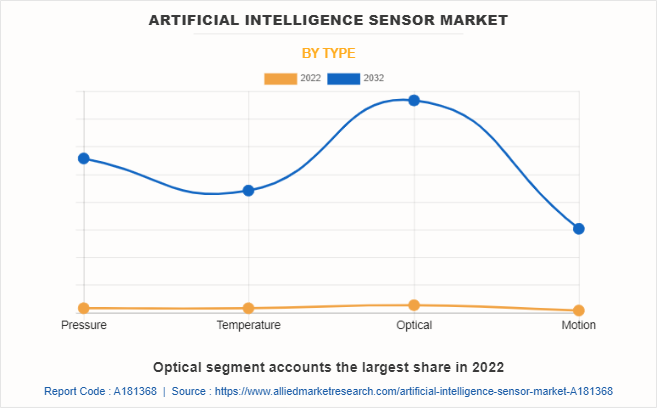
Based on technology, the artificial intelligence sensor market is segmented into NLP, machine learning, and computer vision. Machine learning was the highest revenue contributor to the market in 2022.
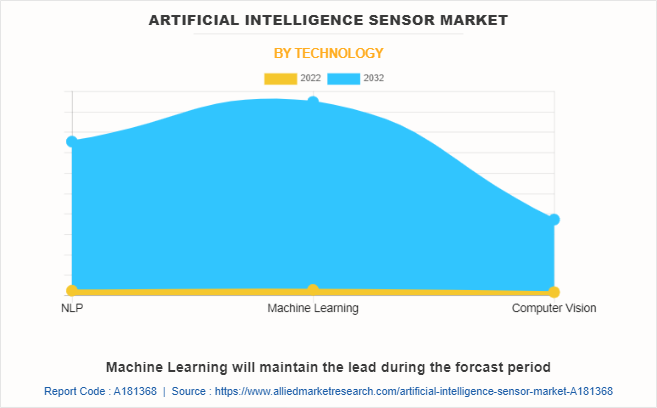
Based on application, the artificial intelligence sensor market is classified into automotive, consumer electronics, manufacturing, aerospace and defense, and others. The consumer electronics segment was the highest revenue contributor to the market in 2022.
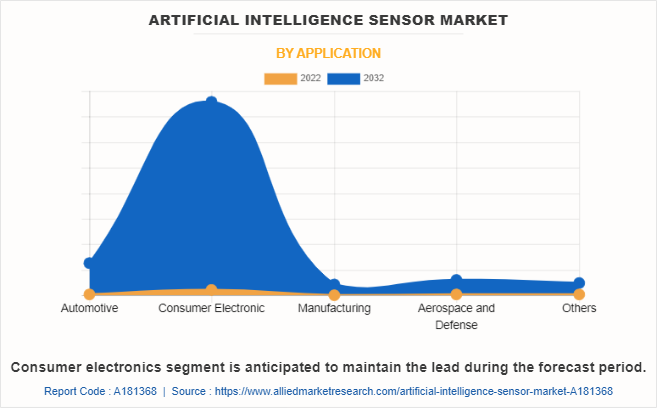
Region-wise, the artificial intelligence sensor market trends are analyzed across North America (the U.S., Canada, and Mexico), Europe (UK, Germany, France, Italy, and the rest of Europe), Asia-Pacific (China, Japan, India, South Korea, and rest of Asia-Pacific), and LAMEA (Latin America, the Middle East, and Africa).
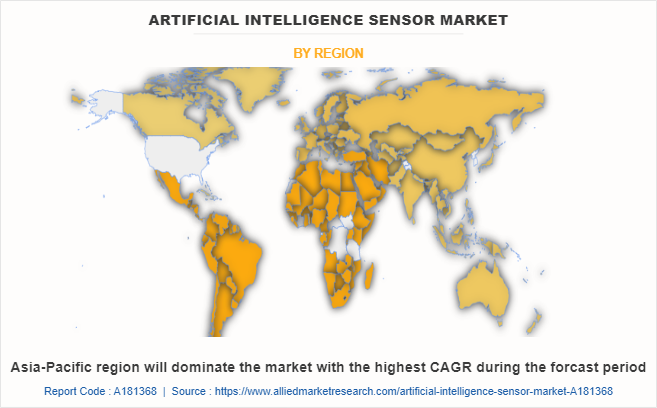
There are various advantages to having artificial intelligence sensor market growth. For instance, it gives you more control over things like energy savings, security, and convenience. AI-enabled devices such as cameras and microphones can gather real-time information from their surroundings by using sensors. This information allows the AI system to recognize patterns, detect objects, evaluate sounds, and monitor environmental changes. AI systems may extract relevant insights and make sound judgments by combining sensor data with strong algorithms. Sensors, for example, aid in the detection of barriers, pedestrians, and road conditions, allowing autonomous vehicles to operate safely.
Secondly, AI sensors enable better decision-making by providing accurate and reliable input data that helps AI models make informed predictions and take appropriate actions. It also enables continuous monitoring, feedback, and adaptation, facilitating the development of AI applications in various fields such as self-driving cars, smart homes, healthcare, and industrial automation.
One of the important drivers of the artificial intelligence sensor market is the rise in demand for AI-powered consumer devices. Many customers are buying smart devices such as smartphones, smart speakers, wearables, and home automation systems. This, in turn, is driving the growth of the artificial intelligence (AI) sensor market. AI sensors such as audio sensors for voice recognition, motion sensors for movement detection, and optical sensors for facial recognition allow the device to understand what we say, recognize our movements, and even identify our faces, respectively. These capabilities help smart devices provide better experiences and personalized interactions to end users.
For instance, the rise in popularity of virtual voice assistants like Amazon`s Alexa or Apple's Siri. These voice-assistance smart speakers are equipped with AI sensors such as microphones and natural language processing capabilities to understand and respond to voice commands. A user can ask questions, play music, control their smart home devices, set reminders, and perform a variety of tasks simply by talking to these devices. The growing adoption and demand for these voice assistants indicate a growing demand for intuitive, interactive smart devices that leverage AI sensors to understand and respond to user needs. As a result, demand for AI sensors is projected to increase as the need for smarter, more intuitive consumer devices across end-user verticals is anticipated to grow throughout the forecast period, which in turn is predicted to boost the market growth.
Furthermore, the growing demand for the Internet of Things (IoT) is driving the growth of the artificial intelligence sensor market by establishing a smooth and convenient ecosystem for entertainment consumption and manufacturing. With the increasing adoption of IoT in various fields such as smart homes, healthcare, manufacturing, and transportation, there is a demand for AI sensors that can enhance the functionality of IoT devices and unlock the full potential of the IoT ecosystem. As more devices and objects are connected to the internet, there is a need for smart sensors that can collect and analyze data and provide valuable insights. AI sensors play a key role in enabling IoT devices to sense and understand the world around them. AI sensors can collect data from various sources such as temperature, humidity, motion, and sound, and process it using AI algorithms to extract meaningful information. This data-driven intelligence enables IoT devices to make informed decisions, automate processes, and streamline operations.
On the other hand, high installation and maintenance costs hinder the growth of the market. Deploying AI sensors often requires significant upfront investment due to the advanced technology and infrastructure required. Moreover, the maintenance and calibration of these sensors can incur additional costs over time. This cost includes not only the purchase of the sensor but also the necessary supporting infrastructure, such as data storage and processing systems. In addition, installation and maintenance may require special expertise and qualified professionals, increasing overall costs. These high costs can be a roadblock, especially for small businesses and organizations with limited budgets, and hinder the adoption and use of AI sensor technology.
Separately, with a greater emphasis on developing sustainable and intelligent urban ecosystems, the demand for machine learning sensors is predicted to expand, opening up opportunities for sensor manufacturers and technology providers to contribute to the creation and implementation of smart city programs around the world. Smart cities rely on interconnected systems and modern technologies to improve urban efficiency, sustainability, and livability. AI sensors play an important part in enabling smart city infrastructure by allowing for real-time data collection, monitoring, and analysis. These sensors can be used in a variety of applications, such as transportation, energy management, public safety, waste management, and environmental monitoring. They can monitor traffic patterns, detect contaminants in the environment, optimize energy use, and improve overall infrastructure management, thereby creating an opportunity for the market.
Top Impacting Factors
The market for artificial intelligence sensor market is anticipated to expand significantly during the forecast period, owing to the rise in demand for smart consumer devices. In addition, the increase in the adoption of AI technologies and the growing demand for the Internet of Things (IoT) fuels the market growth. Moreover, the artificial intelligence sensor market outlook is anticipated to benefit owing to the surge in the development of smart cities and infrastructure, and the growing preference for AI-sensor-enabled wearables, which is expected to present enormous opportunities for the market over the forecast period. On the other hand, high installation and maintenance costs are anticipated to restrain the market growth during the forecast period.
Competitive Analysis
Competitive analysis and profiles of the major artificial intelligence sensor market players, such as Robert Bosch GmbH, Teledyne Technologies Incorporated, Sensirion AG, Sensata Technologies, Inc., MEMSIC Semiconductor, Goertek Inc., Hokuriku Electric Industry, Sony Corporation, TE Connectivity, and STMicroelectronics N.V., are provided in this report. Product launch and acquisition business strategies were adopted by the major market players in 2022.
Historical Data & Information
The artificial intelligence sensor industry is highly competitive, owing to the strong presence of existing vendors. Vendors in the artificial intelligence sensor market with extensive technical and financial resources are expected to gain a competitive advantage over their competitors as they can cater to market demands. The competitive environment in the artificial intelligence sensor industry is expected to increase owing to technological innovations, product extensions, and different strategies adopted by key vendors.
Key Developments/ Strategies
Robert Bosch GmbH, Teledyne Technologies Incorporated, Sensirion AG, Sensata Technologies, Inc., MEMSIC Semiconductor, Goertek Inc., Hokuriku Electric Industry, Sony Corporation, TE Connectivity, and STMicroelectronics N.V. are the top companies holding a prime share in the global artificial intelligence sensor market. Top market players have adopted various strategies, such as expansion and investment, to expand their foothold in the aeroponics market.
- In March 2023, Teledyne Technologies Incorporated launched advanced AI enhancements to its image processing software, incorporating artificial intelligence capabilities to improve image analysis and processing performance. The new features aim to provide more efficient and accurate image-processing solutions across various industries.
- In June 2022, Sensata Technologies launched a predictive asset monitoring solution for rotary assets, as reported by Energy Monitor. The new solution incorporates advanced sensor technology and predictive analytics to monitor and assess the health and performance of rotary machinery in real time. By leveraging predictive maintenance techniques, the system can identify potential issues and anomalies in rotary assets before they lead to costly failures or downtime.
- In April 2022, Robert Bosch GmbH acquired Five AI (France) to increase its position in the smart mobility solutions and autonomous vehicles markets. Five AI (France) company specializes in self-driving software components and development platforms. This strategic acquisition enabled Robert Bosch GmbH to address key challenges in the self-driving car sector, thereby enhancing its capabilities in the autonomous vehicles market.
- In May 2022, Sensata Technologies launched the new wireless 6VW series Internet of Things (IoT) sensor designed to aid the predictive maintenance of rotary assets. Moreover, the 6VW is a wireless sensor capable of operating on cellular, LTE, or Wi-Fi. It is a multimodal sensor that allows the collection of various data points beyond vibration due to sensor fusion onboard several sensors. The sensor can collect temperature, vibration, and acoustics information to provide customers with a more accurate picture of the health of their machine.
Key Benefits For Stakeholders
- This report provides a quantitative analysis of the market segments, current trends, estimations, and dynamics of the artificial intelligence sensor market from 2022 to 2032 to identify the prevailing artificial intelligence sensor market opportunity.
- The market research is offered along with information related to key drivers, restraints, and opportunities.
- Porter's five forces analysis highlights the potency of buyers and suppliers to enable stakeholders to make profit-oriented business decisions and strengthen their supplier-buyer network.
- An in-depth analysis of the artificial intelligence sensor market forecast segmentation assists in determining the prevailing market opportunities.
- Major countries in each region are mapped according to their revenue contribution to the global artificial intelligence sensor market.
- Market player positioning facilitates benchmarking and provides a clear understanding of the present position of the market players.
- The report includes an analysis of the regional as well as global artificial intelligence sensor market trends, artificial intelligence sensor market outlook, key players, market segments, application areas, and market growth strategies.
Artificial Intelligence Sensor Market Report Highlights
| Aspects | Details |
| Market Size By 2032 | USD 103.4 billion |
| Growth Rate | CAGR of 41.8% |
| Forecast period | 2022 - 2032 |
| Report Pages | 266 |
| By Type |
|
| By Technology |
|
| By Application |
|
| By Region |
|
| Key Market Players | Sony Corporation, MEMSIC Semiconductor Co., Ltd., HOKURIKU ELECTRIC INDUSTRY CO., LTD., Sensata Technologies, Inc., Sensirion AG, Robert Bosch GmbH, Teledyne Technologies Incorporated, TE Connectivity Ltd., Goertek Inc., STMicroelectronics N.V. |
Analyst Review
The global artificial intelligence sensor market holds high potential for the semiconductor industry. The business scenario witnesses an increase in the demand for artificial intelligence sensor devices, particularly in developing regions, such as China, India, the U.S., the UK, and others. Companies in this industry have been adopting various innovative techniques to provide customers with advanced and innovative product offerings.
The rise in demand for smart consumer devices, growing demand for internet of things (IoT), and increase in adoption of AI technologies in artificial intelligence sensor drive this market. However, high Installation and maintenance costs impede this growth. During the forecast period it is anticipated to witness growing preference for AI-sensor enabled wearables, and surge in development of smart cities and infrastructure is expected to create lucrative opportunities for the key players operating in this market.
The market participants are expected to introduce technologically advanced products to remain competitive in the market. Product launch and collaboration are the prominent strategies adopted by the market players.
Adoption of machine learning technology is the upcoming trend in artificial intelligence sensor market.
Consumer electronics is the leading application in artificial intelligence sensor market.
North America is the largest regional market for artificial intelligence sensor market.
The global artificial intelligence sensor market. was valued at $3.16 billion in 2022.
The top companies to hold the market share in artificial intelligence sensor market are Robert Bosch GmbH, Teledyne Technologies Incorporated, Sensirion AG, Sensata Technologies, Inc., MEMSIC Semiconductor, Goertek Inc., Hokuriku Electric Industry, Sony Corporation, TE Connectivity, and STMicroelectronics N.V.
Loading Table Of Content...
Loading Research Methodology...



